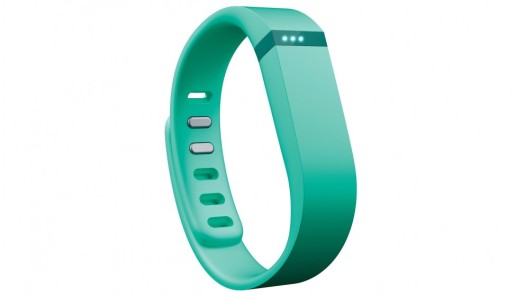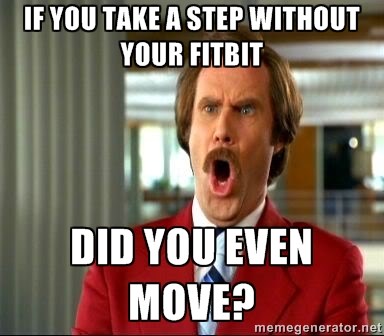
Let me start off by saying, I think fitness trackers are great. For the last 2.5 years, I constantly had one on my wrist, and it taught me a lot about myself. But, when I lost mine a few weeks back, it gave me the opportunity to step back and evaluate how my relationship with it had changed over time, and whether I still needed it. The answer surprised me.
The beginning.
I spent my 26th birthday with Matt in Austin, Texas. He was working a project in Houston, and we met at the airport where he greeted me with a box of sinfully delicious cupcakes and a brand new Jawbone Up fitness tracker. As we set off for the drive to Austin, we polished off a pair of cupcakes and synced our new trackers to our phones, ready to find out just how active we really were.
For me, it was love at first sync. From the minute I put the band around my wrist, I was smitten. The tagline on the outside of the box “Know Yourself, Live Better” spoke to exactly what I hoped to achieve, and this seemed like a great step in that direction.
I loved seeing patterns emerge as I amassed data about my daily steps and sleep. (I never used the app to track food, or calories). Access to this information felt empowering. It helped me identify areas where I could improve, and it motivated me to make behavior changes in order to meet my goals. As a goal oriented person, it was fun to see my “streak” build up and to look back at my achievements over time.
For the first several months, my tracker had a really positive impact in a few ways:
- It kept me honest on days when I was glued to my computer. Just because I was tired at the end of the day, didn’t necessarily mean I had expended much physical energy.
- It reminded me to get up and move when I had been sitting for too long. I got a stand up desk for my home office, and took more walks throughout the day.
- It brought more attention to my sleep patterns. It wasn’t until I wore the tracker that I really realized the impact sleep had on my ability to perform at my best, and I started to focus more on getting to bed on time.
So, things were going well. I was learning more about myself, and using that information in a positive way. I wore a fitness band (first a jawbone, later a fitbit) religiously over the years that followed and couldn’t imagine life without it.
The shift.
Somewhere along the way though, something changed. At some point, I stopped using the tracker as a source of knowledge, and started using it as a source of validation. What should have made me more confident in my ability to understand myself and my body, actually made me trust myself less, as I started to rely on the tracker as the ultimate validation that I was doing enough.
Instead of feeling good on days when I met my step goals, I found myself constantly raising my bar and feeling bad that I hadn’t done more. I needed it to give me that pat on the back, and to assure me that I was on track, even if that meant doing things that weren’t actually productive to my overall heath and well being.
I’ll admit, it got a little irrational.
Am I the only one who has tried to push a grocery cart with one hand, or refused to carry their laptop bag on the opposite shoulder for fear on their steps not “counting”?
While I knew logically, that the number read out in my app was far from the most accurate measure of my actual activity and wellness, sometimes it was just easier to trust a number than it was to trust myself.
A blessing in disguise.
Despite starting to recognize that the device might not have been as helpful as it once was, I continued to wear it.
Then, one fateful day Matt and I were leaving Homy (the Chilean equivalent of Ikea), and I looked down to realize that my tracker slipped off my wrist somewhere in the maze of futons and lighting fixtures. For a moment, I thought about going back to search for it, but the idea of returning to the madness that is a discount home furnishings store on a Saturday afternoon was just too much to bear. It was time to say goodbye.
For the first few weeks, I kept waiting for the other shoe to drop. I wondered if, without the accountability of the tracker, I would suddenly become a slacker. How would I know that I was doing enough?

But with each passing day, I realized that the habits I had formed over the time I had worn the tracker weren’t going anywhere. I am a very active person by nature, and that wasn’t suddenly going to change.
I live in a city where I barely ever drive. I love being outside, and take walks often, both for enjoyment and for transportation. Matt and I spent our honeymoon hiking through the Canadian Rocky Mountains. We have been intentional about leading active lifestyles and in the 6 or so weeks we had been living in Santiago, there had been only one day where I didn’t hit my step goal. I didn’t need the tracker to continue tell me I was active, it had already done that.

Now, I just needed to let go and trust myself again. It was surprisingly liberating.
Sure, there may be days when I take a few less steps than I might have if I had been wearing the tracker. But overall, I don’t need the tracker to motivate me. I can do that for myself. Now, without it, I am more in touch with what my body really needs and I can relax and enjoy myself to a greater extent, without constantly feeling like I need to keep track or check in with my app.
To everything there is a season.
As I said before, I have no vendetta against fitness trackers or apps that help track activity, sleep or nutritional data. For awhile, my tracker was incredibly helpful, but over time I lost track of its true purpose and let it become a hindrance instead of a tool.
And I’m not the only one.
On a recent episode of one of my favorite podcasts, Note to Self, host Manoush Zomorodi asked listeners to call in with stories about their relationships to fitness trackers and apps. The responses she got made me realize I’m not alone in trying to navigate this new, data filled, fitness arena.
These devices can be a great tool for someone who is a trying to get started with a new fitness or weight loss program, or for someone wanting understand habits and patterns in the midst of a life change. Responses varied widely, a reflection that there is a wide range of uses and abuses for these devices, and getting the most out of them is largely a matter of understanding where you are on your fitness journey, and how helpful or unhelpful a tracking app or device might be for you during this stage.
At the end of the day, the devices themselves aren’t inherently good or bad. What’s important is for us to take a step back and understand how we’re using them and why.
Who knows, maybe there will come a time when I decide to strap one back on, but for now, I’m happy with just a good old fashioned chronograph watch on my wrist.


Great perspective! I love reading your posts. Not just to hear about your experiences, but I love the way you write and enjoy reading what you have to say.
Thanks Catherine! Really glad you’re enjoying them!